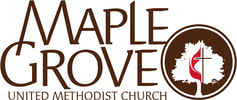Opened and Mending
2nd Sunday of Lent, 2021 Maple Grove UMC Rev. Patricia Wagner Mark 7:31-37 31 Then he returned from the region of Tyre, and went by way of Sidon towards the Sea of Galilee, in the region of the Decapolis. 32 They brought to him a deaf man who had an impediment in his speech; and they begged him to lay his hand on him. 33 He took him aside in private, away from the crowd, and put his fingers into his ears, and he spat and touched his tongue. 34 Then looking up to heaven, he sighed and said to him, “Ephphatha,” that is, “Be opened.” 35 And immediately his ears were opened, his tongue was released, and he spoke plainly. 36 Then Jesus[a] ordered them to tell no one; but the more he ordered them, the more zealously they proclaimed it. 37 They were astounded beyond measure, saying, “He has done everything well; he even makes the deaf to hear and the mute to speak.” Balm In Gilead: I remember the first time I really heard that song: when the Knoxville College Choir came to sing at our church in Richwood, Ohio. It was the 1960's. The African Americans in town lived, literally, on the other side of the tracks. And these students came, maybe 50, and Dad, a pastor had invited them to come on their tour, and had folks in the congregation take them in for the the night to sleep. Perhaps the only time that would happen in any of their lifetimes, the students or the small town and farm folk. We all knew it was a gift, a sort of healing as was their music, including this song, which is remarkable for it’s coming out of peoples who have known suffering. It’s an answer to a question that is posed by the people to Jeremiah. And to hear it, let's imagine ourselves one year back, when the pandemic was beginning, everything was closing and no vaccine was in sight. The people were desperate, they had heard that a salve made from the balsam tree, native there, might have healing properties. “Is there no balm in Gilead?”, asked the people, “Is there no healing there?`` So much of scripture is about human brokenness and healing It speaks to personal condition: infertility and bleeding and boils of brokenness in family life, of greed and guilt and lost souls. Into this world came Jesus who tapped into God's power to recreate us, to heal us. But also brought a new teaching: sickness is not sin, he said, but sin is sickness; injustice is our own brokenness. I saw some videos this week of attacks on a young man who folks called the police over because he looked sketchy. And a young man slamming into an old man causing his death because he was Asian. Beyond this outward brutality are the things that we as a society do that make life for the poor and working folk harder. We have cracks in our humanity, and we might want to cover them up, with excuses or shield ourselves from the pain that's out there, or in here. But, Jesus always seemed to be able to see what was broken beneath the surface like the Woman at the well, made her wounds plain before she could begin to be changed. He there is tradition in Japanese ceramics called Kin-sin-tu. It’s based on a philosophy called Wabi-Sabi that accepts our imperfection, our impermanence. In ceramics, rather than try to hide or disguise the fractures and breaks of a broken vessel, the mender uses a gold bond to reveal those lines of brokenness more clearly, and somehow, the fixed vessel becomes more beautiful than before. We have a vessel like this, and Helen Hughes is going to begin the process of mending it, using this method. And while she does that, we will consider this healing story only found in the Gospel of Mark. Jesus has traveled farther north than at any other time in our Gospel records. He is in the region of the Gentiles, those who were not Jews. And he is brought a man who cannot hear and who struggled to speak. So many do, and for such persons, the hearing and speaking most of us do every day is so longed for, so miraculous. I think of the friends of this man, rushing to his home. He's here, he's come all the way here, and hurrying to bring him before Jesus for surely this was his only chance. Mark says that Jesus takes the man aside away from the others, put his fingers in the man's ears, touched his tongue with a bit of his own saliva, his own life force. Raises his eyes to the source of his life' force and says: Ephatha - Be Opened! And the man heard and spoke. He commanded that the people not speak about it, but unlike the waves in the water, when Jesus spoke, when he speaks, people tend not to follow. Jesus channeled a power that mended bodies, but the mending he was focused on was for our souls. He could see our brokenness and the ways we cover up and cover over the broken bits. We do this as persons, as nations, as peoples. But Jesus says to us, as he places his spirit upon us, as he touches our life with his own essence, Ephatha, Be Opened, he says, unveiling our wounds then opening our ears that we might hear the cries of the world and our own, then unleashes our tongues to speak the truth about what is around us, about what is within us. And then he claims us, broken open and mending for God. He claims your life, in all the ways you are broken open and mending for God, and says, come join my band, mend in community, and in that meeting, in that healing is the love that binds us back together. For there is a balm in Gilead, say those who came out of slavery, that makes the w0unded whole, that heals the sin-sick soul, even me, even you, even us. Let us open ourselves to that life force to that mending, to that healing. Thanks be to God.
0 Comments
Leave a Reply. |
|||||||
Parking
The Maple Grove parking lot on the south side of the church which is accessed from Aldrich Road, the first street south of Henderson Road.
The Maple Grove parking lot on the south side of the church which is accessed from Aldrich Road, the first street south of Henderson Road.

 RSS Feed
RSS Feed
